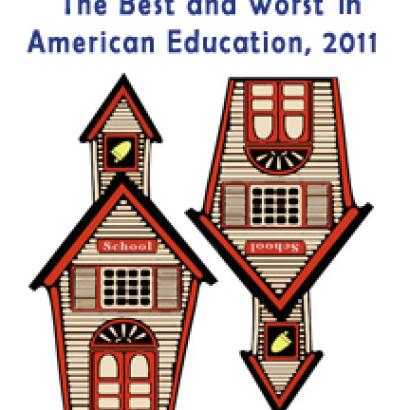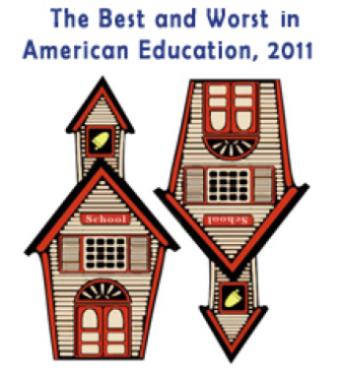
To inform the public and shape education reform in the upcoming year, members of the Hoover Institution’s Koret Task Force on K–12 Education today released their annual list of the top five best and top five worst events in American education in 2011. Their list indicates that several positive developments led to greater parental choice, system transparency and teacher accountability; however, the worst events indicate that considerable room remains for improvement.
“We evaluated hundreds of events, laws, programs, and studies in creating this list,” said Williamson M. Evers, Hoover research fellow and project coordinator of the education task force’s Best and Worst project.
Topping the list as the best educational development in 2011 was reinvigorating school choice via opportunity scholarships and vouchers. The result is that private school choice moved ahead in many parts of the country in 2011. The worst development in 2011, according to the task force, was the misreporting of the Atlanta public schools’ cheating scandal. Here, Evers said, “when educators couldn’t successfully teach their students, they doctored the students’ test papers, but the news media let the cheating educators off the hook.”
According to Evers, when the task force considered the most counterproductive or foolish developments, it looked for major steps backward. Task force members, Evers said, were dismayed when union power “stopped school districts from making needed reforms” or when a governor’s “utopian philosophy” blocked “the possible in the name of the impossible.” Task force members found the Obama administration and both parties in Congress “dismal” when it came to administering reform programs and fixing laws that need updating.
But task force members were heartened when parental power was strengthened in California and voters were given greater say in Indiana. Once-untouchable collective bargaining agreements and teacher-evaluation systems became subject to reform in 2011, a change that was welcomed by task force members as improving flexibility and teacher quality. Indiana’s “amazing record” of school reform in 2011, according to Evers, boosted the morale of reformers across the country.
Task force chairman Chester E. Finn Jr. said that in 2012, task force members will continue to support “strengthened academic standards, expanded school choice, and increased accountability.” During the next year, the presidential race will offer “a national stage on which to debate education policy” and Congress is expected to rework the major law authorizing federal aid to education. Finn says that “2012 should be filled with opportunities for improving schools and enhancing students’ learning.”
BEST Education Events of 2011
1. Reinvigoration of school choice via opportunity scholarships and vouchers.
Despite the attractive choice that private schools (especially Catholic schools) offer in many inner cities and notwithstanding the Supreme Court’s resolution of issues of federal constitutionality, private school choice remained largely politically taboo until this year. In what history may view as a watershed, private school choice moved ahead in many places in 2011, including the District of Columbia, where the scholarship program was resuscitated in Congress by Speaker John Boehner; Indiana, where opportunity scholarships were made available to perhaps half the state's students; and Ohio, which lifted a too-tight cap on its program for kids exiting low-performing schools.
2. Rollback of collective bargaining agreements (CBAs) in Wisconsin, Indiana, New Jersey, Idaho, and (temporarily) Ohio.
Progress in improving education is slowed by union contracts that impede sensible decisions about the hiring, firing, deployment, and compensation of educators. CBAs also drive up costs. Moreover, many public sector workers are generously compensated—and enjoy relatively secure jobs—and their gold-plated benefit systems are bankrupting states and school systems. Voters and courageous state leaders finally put these issues on the table in 2011, and five states made major reforms in the pertinent statutes. (Ohio’s were undone in a November referendum.) Besides actual progress in modifying and limiting the scope of CBAs, states have now made changing CBAs a normal area for reform.
3. California State Board of Education’s rules that allow the “parent trigger” to operate.
Under the parent trigger, if a petition signed by more than half the parents in a school requests it, a district public school must be turned into a charter school or there must be some other transformational remedy. California was the pacesetter in 2010. Four more states have since passed laws creating such a mechanism, and similar measures are under consideration in dozens of other states. The implementing rules promulgated by the California State Board of Education during 2011 are crucial, however; without them, the parent trigger would be mired in legal and procedural disputes.
4. Former DC chancellor Michelle Rhee's teacher-evaluation system left in place by new mayor Vincent Gray without substantial change.
When Gray replaced Mayor Adrian Fenty in 2010 with union support, it was widely supposed that he would roll back Rhee’s path-breaking teacher-evaluation plan. That plan deviated boldly from standard systems for teacher evaluation, which typically find virtually every teacher’s performance satisfactory (or better). The District of Columbia’s multifaceted, two-year-old IMPACT system is generally viewed by teachers as fair and is being used– by Chancellor Kaya Henderson–to judge teacher performance and authorize dismissals based on classroom ineffectiveness (and other factors). It also offers financial rewards to teachers doing the best jobs. It should serve as a national model.
5. Indiana’s overall record of education reform.
During 2011, Indiana abolished collective bargaining for teacher benefits and work rules. It allowed all universities to authorize charter schools and removed its cap on charter schools. The legislature also enacted a program of opportunity scholarships for low-income students that Indiana state superintendent Tony Bennett has correctly described as “the nation’s most expansive.” Indiana moved school board elections from spring to fall, in effect empowering the broader public to participate in the governance of its school systems. In sum, Indiana has the best reform record of any state in 2011.
WORST Education Events of 2011
1. The Atlanta cheating scandal.
This scandal was truly harmful for standards-based education reform, particularly because of how thoroughly it has been misinterpreted and misrepresented. What the public should have learned from the Atlanta fiasco is that cheating is easily preventable via test security (e.g., having a huge bank of publicly available questions of which a subset appears on each year’s test; proctoring the rooms in which tests are given; securing the test papers; online test administration). Instead, what the public has “learned” is that testing is bad because it creates so much stress that well-meaning educators are pushed to the limit and eventually succumb (for the children’s sake, of course!) to cheating, lying, and breaking the law.
The cynicism with which some district administrators, teachers, and principals approached their responsibilities to the children of Atlanta is appalling. When they couldn't educate their students, they doctored their test papers in a systemwide effort to mislead parents, public officials, and the community into believing that they were doing a good job. This is all the more discouraging because many Atlanta public school parents are poor and enjoy fewer choices of alternative schools than are available in other major cities.
2. Bungling of reauthorization of No Child Left Behind by a slowpoke Congress and a Constitution-oblivious president.
Congress has further delayed the overdue reauthorization of the Elementary and Secondary Education Act—also known as No Child Left Behind—whose shortcomings have long needed fixing. Both parties share the blame for the delay. Now, using the dilatory Congress as his excuse, President Obama has turned to backdoor legislation-via-waivers. Such waivers will enact his pet reforms (some of which have merit) by decree. But the waivers have major constitutional and legal problems and have created even more bad blood with Congress. Public schools need accountability, whether through standards or school choice (or both). But, thus far, Congress and the president have bungled this.
3. Postponement and delay by Race to the Top–winning states and weak oversight by the Obama administration
From an oversized pool of winners, favoring states with stakeholder (read, union) buy-in in 2010, to slowdowns in the pace of innovation by winners, to the administration’s acquiescence to such dithering, this is no longer a race at all. States plod forward with tepid reforms. Delays are widespread. Where are the overdue, promised expansion of the number of charter schools, the promised performance-based teacher pay programs, and the promised data systems linking teachers to their students’ test results? Georgia, Massachusetts, North Carolina, and, in particular, Hawaii are shameful laggards when it comes to teacher evaluations, which they promised to base in large measure on student gains.
Taxpayers watching this fixed race should demand their money back.
4. Governor Jerry Brown moving California from bad to worse.
Governor Brown signed California’s AB 114, under which districts must retain staffing levels in the face of budget tightening—but may cut up to seven instructional days from the school year. What is the worst possible way to deal with school district budget woes? Shortening the year. But California, always proud of being a leader, has written into law that this is the preferred option when districts face budgetary shortfalls.
To top this off, when vetoing SB 547, Brown dismissed the use of test-score data and signaled that he’d like to do away with testing altogether. Does this portend the demise of accountability in our largest state? He complained, among other things, that test scores don’t measure “good character” or “love of learning.”
5. The unions’ victory in Ohio in overturning Governor Kasich’s collective bargaining reforms.
Ohio’s public sector unions are understandably upset by the reform of their own collective bargaining laws and practices, and on election day in November, they managed to undo a major reform measure. In reality, this vote had little to do with education—most Ohioans favor the kinds of education changes in that law (Senate Bill 5)—but, rather, with the police and firefighters who appeared on television all autumn suggesting that crime would rise and fires would burn if this measure were not undone. (It was a well-orchestrated and extremely well-funded campaign.)
Yet fiscal reality will have to be faced eventually. Ohio is already on the verge of collapse. Its school districts face a deficit of close to $8 billion by 2015. Polls show that Ohio voters want benefits for public employees to resemble those in the private sector. In time, that means that Ohio teachers will have to pay more toward their health benefits and accept other reasonable changes or their districts will go broke and their students’ learning will never improve.
Hoover’s Koret Task Force on K-12 Education focuses on education policy solutions that stress choice, accountability, and transparency. For more information on the Hoover Institution’s Koret Task Force on K-12 Education, visit Hoover.org or find us Facebook, Twitter, and Scribd (keyword: Hoover Institution).
Participants in the Koret Task Force’s Best and Worst Project
- Williamson M. Evers is project coordinator of the Koret Task Force on K–12 Education project on the Best and Worst in American Education, 2011. He is a research fellow at the Hoover Institution and a former U.S. assistant secretary of education.
- Chester E. Finn Jr., Task Force on K–12 Education chairman, is a senior fellow at Hoover and president of the Thomas B. Fordham Institute.
- John E. Chubb is a distinguished visiting fellow at Hoover and CEO of Leeds Global Partners.
- Eric Hanushek is the Paul and Jean Hanna Senior Fellow at Hoover and chairman of the Executive Committee for the Texas Schools Project at the University of Texas at Dallas. He was featured in last year’s documentary, Waiting for Superman, for his research on teacher accountability.
- Paul T. Hill is a Hoover Institution distinguished visiting fellow and professor and director of the Center on Reinventing Public Education at the University of Washington.
- Caroline M. Hoxby is a senior fellow at Hoover, the Scott and Donya Bommer Professor at Stanford University, and director of the Economics of Education Program at the National Bureau of Economic Research.
- Tom Loveless is a senior fellow at the Brookings Institution.
- Terry M. Moe is a senior fellow at Hoover and the William Bennett Munro Professor of Political Science at Stanford University.
- Paul E. Peterson is a senior fellow at Hoover and the Henry Lee Shattuck Professor of Government and director of the Program on Education Policy and Governance at Harvard University.
- Herbert J. Walberg is a distinguished visiting fellow at Hoover and chairman of the board of directors of the Heartland Institute.
CONTACTS:
Williamson M. Evers
Mobile: (650) 380-1546
Chester E. Finn Jr.
Office: (202) 223-5450
Mobile: (202) 285-6600
cefinnjr@aol.com





















